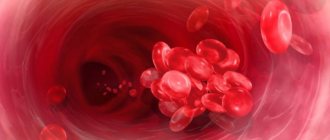Provoking factors
Bloody feces during pregnancy are often caused by hormonal and physiological changes in women during pregnancy.
An enlarging uterus causes problems with the digestive system. The result is constipation, which leads to anal fissures and hemorrhoids.
The presence of cracks in the rectum can be recognized by faint traces of blood and inclusions in the stool. The color of the blood is red, the amount is insignificant.
Scarlet blood indicates the appearance of hemorrhoids. In this case, the bleeding is abundant and constant. May be released between trips to the toilet.
Often it is pregnancy that causes hemorrhoids and quickly disappears after childbirth. Can be called:
- unhealthy diet;
- large fruit;
- multiple pregnancy;
- varicose veins.
Dark coagulated blood in the stool indicates an excess of iron in a woman’s body. In this case, the stool takes on a black tint. The consistency and smell do not change.
To solve the problem, it is enough to exclude from the diet foods containing high amounts of iron and vitamin complexes with this element.
Liquid black stool with a pungent odor indicates bleeding in the upper parts of the digestive system, which is life-threatening.
In this case, you must immediately go to the hospital to receive qualified medical care.
Other diseases can also cause blood in the stool of a pregnant woman. Among them:
- peptic ulcer. The amount of blood is determined by the location of the ulcers and the stage in which the disease is located. The composition and consistency of stool may not change;
- proctitis When rectal ulcers bleed, mucus is often found in the stool in addition to blood;
- polyps. The color of the blood remains red. Possible formation of clots when mixed with feces;
- diverticula. Damage to formations in the form of bulging on the walls of the colon may be accompanied by bleeding;
- colitis. Manifested by loose stools with bleeding and mucus;
- rectal cancer. Can be confused with polyposis and has the same symptoms.
Each of these diseases is extremely dangerous during gestation. At the first signs of blood in the stool, you must inform the doctor managing the pregnancy.
Normal stool during pregnancy
Normal feces during pregnancy are an indicator of the functioning of the liver, which during this period works with increased load. The preservation of feces depends on the liver, but its smell and consistency can change significantly, since most women take various multivitamin complexes during pregnancy. Most of them contain a trace element such as iron, which has a significant effect on changing the color of stool and gives it a dark color.
Many experts believe that stool turns black because the body is ridding itself of excess iron. Of course, the body absorbs the required amount of this microelement, but it gets rid of excess in this way. It is for this reason that women during pregnancy should not have concerns about dark or even black stool.
If taking various vitamin complexes during pregnancy is not accompanied by a change in the color of the stool, then this only confirms their quality. During pregnancy, it is necessary to pay increased attention to the state of your health and, in case of any unusual or painful condition, report it to your doctor.
The nature of diarrhea during pregnancy and its causes
In case of stool disorder, it is necessary to pay attention to the nature of the stool; certain signs may indicate the presence of diseases
Loose stool mixed with blood in the later stages
Bloody feces occur during pregnancy due to normal physiological reasons, which is natural, and due to diseases that require treatment.
Blood clots from the anus may indicate the following problems:
- Anal fissure, which occurs due to disruption of the intestine by hard feces. Blood can be either in the stool or after a bowel movement. In this case, the woman experiences pain in the anus, burning and itching, especially after going to the toilet.
- The companion of almost all pregnant women is hemorrhoids. The occurrence of the disease is provoked by hormonal changes, gained kilograms, poor nutrition and reduced immunity. Hemorrhoids usually go away after childbirth. If during pregnancy it causes inconvenience, you should consult a doctor and choose the right treatment.
- Due to ulceration of the rectal mucosa, a dangerous disease can develop - proctitis. The main symptom is stool with blood and mucus, frequent urge to go to the toilet.
- Blood clots occur with polyps. The amount of blood directly depends on the size of the formations.
- Due to inflammation in the gastrointestinal tract, colitis develops, which causes diarrhea with blood and mucus.
- Stomach or duodenal ulcer.
- A life-threatening disease - rectal cancer is accompanied by abundant blood clots in the stool.
The reasons for the appearance of blood in the stool are different, so a woman in labor must undergo diagnostics. More often during pregnancy, such stool is associated with hemorrhoids and anal fissure, but it is better to undergo an examination to rule out the disease.
With mucus in the early stages
Mucus in stool in the early stages may occur due to irritation of the intestinal walls, usually associated with prolonged constipation. It, in turn, arises due to a woman’s inactive lifestyle, which often happens in the first trimester.
Toxicosis, apathy, and malaise cause a desire to lie down and do nothing, and some ladies are forced to remain in bed due to the threat of miscarriage. After normalization of the intestines, mucus disappears from the stool.
But if there is an unpleasant odor, blood and foaming feces, you should urgently consult a doctor, this may indicate an infectious, inflammatory disease (colitis, enteritis, etc.).
Loose stools containing undigested food in the second trimester
The appearance of undigested food in diarrhea can be caused by the following reasons:
- due to overeating, it is difficult to digest large amounts of food, especially fatty foods;
- taking certain medications reduces digestive function;
- dysbacteriosis;
- insufficient production of enzymes necessary for the breakdown of proteins;
- inability of the intestines to digest food - dyspepsia;
- gastrointestinal diseases.
To find out the exact factor that provokes the presence of loose stools with pieces of food, a woman must undergo diagnostics.
Frequent diarrhea
Defecation two to three times a day is considered normal; more than three is diarrhea. There are several types:
- Acute – occurs due to poisoning or viruses, lasts no more than three days.
- Not going away - diarrhea continues for ten to fourteen days and there is no improvement.
- Chronic – observed for more than a month.
During pregnancy it usually occurs due to:
- poor nutrition;
- poor quality food;
- intestinal irritation;
- exacerbation of chronic diseases;
- pressure of the uterus on organs;
- taking certain medications.
Having found out the nature of diarrhea, you can adjust the treatment and eliminate the discomfort.
It is important to pay attention to the nature of the stool, color and smell. With normal functioning of the gastrointestinal tract, the stool is yellow, homogeneous and without a strong aroma. The presence of mucus and blood may indicate problems
The presence of mucus and blood may indicate problems.
Prevention
Preventive measures to prevent the appearance of blood in the anus in pregnant women are aimed at ensuring that the intestines begin to function normally. After all, the main reason is problems with stool.
To get a positive result, the following measures must be observed:
- Use laxatives to regulate bowel movements if diets do not help.
- Eat more dairy products and plant foods to avoid constipation.
- Move more - exercise, walk, swim.
- Take only those medications prescribed by your doctor.
- Learn exercises to strengthen the pelvis and perform them.
- Wash with cool water after each bowel movement.
- Use only soft toilet paper.
- Drink approximately 10 glasses of water per day.
No woman is immune from hemorrhoids and other similar problems. This means that you need to be as attentive as possible to your body. And if something goes wrong, you should immediately contact a specialist.
Inflamed nodes are extremely unpleasant. They are able to change the rhythm of life. A person suffering from them becomes irritable, restless, and nervous. There may be problems with appetite and sleep. Therefore, at the first signs of the disease, it is recommended to start treatment. This is especially true for pregnant women.
Blood from the anus during pregnancy is a problem that many women have encountered. And every time expectant mothers experience incredible fear from this phenomenon. The release of blood clots in most cases occurs during bowel movements, but there are cases when blood oozes constantly.
It is important to make sure that it is anal bleeding and not vaginal bleeding in order to more accurately determine the causes. As soon as you notice that you have started bleeding from the anus, contact your doctor immediately. It is necessary to determine whether there is a threat to the child’s life or not.
Treatment
When spotting appears at any stage of pregnancy, it is necessary first of all to establish its cause.
If such a condition is not associated with physiological factors, it is necessary to begin treatment immediately after diagnosis, since the life of the unborn child and the health of the woman may depend on it.
Taking into account the identified pathology, conservative and surgical treatment methods are used.
Conservative methods
Conservative methods mainly involve the use of medications. Taking medications should be based on the standards of treatment for obstetric and gynecological pathologies, the individual characteristics of the pregnant woman’s body and clinical expediency.
In all cases, it is necessary to take into account the effect of medications on the condition of the fetus. Depending on the situation, the use of such drugs is justified:
- Antispasmodics (No-spa).
- Hemostatic agents (Etamsylate, Aminocaproic acid).
- Progesterone drugs.
- Tocolytics (Partusisten).
- Corticosteroids (Dexamethasone).
- Vitamins (E, folic acid).
In case of severe blood loss, plasma substitutes (Hemodez, Reopoliglyukin) are administered, and in case of anemia, iron supplements (Ferrum-lek, Globiron). If a woman is diagnosed with genital tract infections, the use of antibiotics (Amoxicillin, Azithromycin) is necessary.
Some medications during pregnancy are best used in the form of vaginal or rectal suppositories.
In addition to drug treatment, some physical procedures can also be used for miscarriage:
- Electrophoresis with magnesium.
- Electro-relaxation.
- Acupuncture.
- Ozone and barotherapy.
Surgical methods
If conservative measures are ineffective or impractical, surgical treatment is performed. The decision about its necessity is made based on the clinical situation. If an abortion is diagnosed, curettage of the uterine cavity is performed to remove the remains of the embryo.
In case of ectopic pregnancy, endoscopic operations can be performed to remove the fertilized egg from the abdominal cavity or the lumen of the tube. However, in case of severe internal bleeding, the intervention is carried out using open access - through lower laparotomy.
Cervical pregnancy is especially dangerous, the development of which can pose a threat to the mother’s life due to massive and uncontrolled bleeding. In this case, unfortunately, it will not be possible to save the uterus.
If uterine polyps are detected in the first trimester, their endoscopic removal is possible without harm to the fetus. If a woman is bothered by bleeding due to erosion, you can use the following minimally invasive techniques:
- Cryotherapy.
- Laser treatment.
- Electrocoagulation.
- Radio wave therapy.
In many advanced cases, surgery becomes the only method of treating the pathology. Therefore, it is necessary to consult a doctor in a timely manner, when it is still possible to achieve success with conservative therapy.
Bloody discharge in a pregnant woman is an insidious sign that requires a thorough examination to determine the true cause. Correct and timely treatment tactics will preserve the health of the mother and the life of the unborn baby.
Symptoms of bleeding during pregnancy
The leading symptom, regardless of etiology, is discharge with blood from the vagina; it can be scanty or abundant, with or without mucus, clots. Depending on the factor that provoked the bleeding, other manifestations are added.
Ectopic pregnancy
The danger of ectopic pregnancy is that it proceeds in the same way as a normal one, that is, the woman experiences symptoms characteristic of a healthy pregnancy:
- nausea;
- fatigue;
- malaise;
- swelling of the mammary glands;
- weakness;
- delay of menstruation.
The embryo develops, grows, and manifestations appear that are characteristic of ectopic pregnancy:
- intense pain, almost unbearable, in the lower abdomen or on the side where the egg is attached;
- pain increases with movement, bending;
- bright red blood - in case of cervical pregnancy;
- with tubal pregnancy - brown discharge;
- feeling of lightheadedness;
- loss of consciousness.
If the pregnancy is cervical, then the bleeding is very heavy and prolonged, since this place is rich in blood vessels.
Symptoms of a non-developing pregnancy
At the very beginning of pregnancy, especially if it is the first pregnancy, a woman may not immediately understand that something is wrong with the fetus. Most often, pregnant women go to the doctor when heavy bleeding begins - the uterus spontaneously tries to reject the dead fetus. Bleeding does not start immediately when pregnancy is fading. The first symptoms of this condition:
- manifestations of toxicosis cease, if it was observed before;
- the mammary glands stop swelling and hurting;
- a nagging pain of moderate intensity is felt in the lower abdomen.
Then the pain may intensify, become cramping and spotting begins.
Risk of miscarriage
This condition manifests itself with three main symptoms:
- bleeding from the uterus (from light pink spotting to significant discharge reminiscent of menstruation);
- hypertonicity of the uterus, which is determined using ultrasound;
- nagging pain in the abdomen, which can radiate to the lower back.
Increased bleeding and deterioration of general condition most often indicate that a miscarriage is beginning. In this case, the pregnant woman feels severe weakness, dizziness, nausea, and increased pain. The discharge is initially small brownish or red with mucus, but after 1–2 days it becomes abundant, with large clots. Bleeding becomes more severe with straining and movement.
There are several stages of miscarriage:
- Threat of abortion - slight spotting and painful sensations are observed. In this case, the child can be saved.
- The beginning of a miscarriage - the pain becomes cramping, the bleeding intensifies. Pregnancy can still be saved.
- Spontaneous abortion is common, the main symptoms are intense pain and a lot of blood with clots. It is no longer possible to maintain the pregnancy.
Signs of a hydatidiform mole
Along with bleeding, a woman experiences symptoms characteristic of early toxicosis:
- nausea;
- fatigue;
- change in taste;
- vomiting;
- dizziness;
- weakness;
- increasing symptoms of liver failure.
In the discharge, you can often find characteristic bubbles that have come off the chorionic villi (the embryonic part of the unformed placenta). Discharge with blood during hydatidiform mole is frequent, abundant, and leads to the development of anemia.
Implantation bleeding
This type of bleeding does not affect the normal course of pregnancy and is characterized by scanty discharge or a small amount of pure blood. Discharge caused by the implantation of an egg into the uterine wall is never dark in color and can last literally from one hour to 2-3 days. At this time, the pregnant woman may feel slight pain in the lower abdomen, but most often there is no pain.
Signs of breakthrough bleeding
The discharge resembles regular menstrual blood, only in a smaller volume. This phenomenon occurs once at the very beginning of gestation or can be repeated for another 3-4 months.
Bleeding due to gynecological diseases, such as erosion, is usually mild and not accompanied by other symptoms.
Bleeding due to mechanical damage to the vagina or cervix during a gynecological examination or after intense sex also does not differ in intensity. Most often they manifest themselves as light spotting discharge, end quickly and do not recur.
Inflammation
During pregnancy, hormones go wild. Often the body reacts inadequately to such changes. Chronic pathologies that have been dormant for a long time in the patient’s body can worsen and manifest themselves in all their glory. We are talking about nonspecific ulcerative colitis and Crohn's disease.
The symptoms of these diseases may worsen under the influence of pregnancy, or, on the contrary, may subside.
One of the signs of chronic autoimmune diseases is bleeding from the anus. Blood is released in streaks, usually mixed with mucus. The pain syndrome is weak or unexpressed. Patients often experience diarrhea. The first manifestation of inflammation in the intestines can occur in the early and late stages. These conditions are serious and require immediate consultation with specialists. As a rule, the decision on the management tactics of such patients is made not by one doctor, but by a council.
Bleeding from the anus occurs with polyps, benign tumors and cancer. To diagnose this pathology, rectoscopy is needed. But during pregnancy, the indications for this procedure are limited.
When planning a baby, pay attention to your health to avoid unnecessary worries.
One of the methods that can be taken is.
Bleeding during pregnancy - causes
Bleeding during pregnancy can be caused by reasons of various origins and nature. In this case, the pathology develops at any stage of pregnancy. However, women in early and late gestation are at greater risk. If at the beginning of gestation minor bleeding in pregnant women is often caused by the implantation process and is not considered a serious threat, then at a later stage even spotting becomes a cause for concern for doctors.
To determine the exact cause and factor that provoked the disorder, a comprehensive examination of the pregnant woman is carried out. Possible reasons include:
- threat of miscarriage;
- ectopic pregnancy;
- placental abruption.
Bleeding during early pregnancy
Doctors often associate the causes of bleeding that occurs suddenly during early pregnancy with a possible threat of interruption of gestation. The impossibility of implantation, genetic incompatibility, and Rh conflict often become the reason for the termination of a pregnancy that has just begun. In most such cases, spontaneous interruption is observed for up to 5 weeks. At the same time, the woman herself may not even suspect that she is pregnant, mistaking spotting for an extraordinary period.
However, interruption of gestation is often accompanied by the appearance of additional symptoms that make the woman wary and consult a doctor.
Vaginal discharge is accompanied by:
- severe nausea;
- vomiting;
- cramping pain in the lower abdomen, lumbar region, sacrum;
- slight rise in body temperature;
- headache and dizziness.
https://youtube.com/watch?v=QLzpHbCr0-4%250D
Bleeding in mid-pregnancy
Unexpectedly appearing blood from the genital tract during pregnancy always causes panic for the expectant mother. This situation requires diagnosis and medical supervision. According to experts, the most common cause of these symptoms is partial or marginal placenta previa. In such cases, the baby's place is located close to the os of the uterus or partially extends onto it. Excessive tension causes tearing of the placental tissue, which provokes the appearance of blood from the vagina.
Among the possible reasons that provoke partial placental abruption, doctors name:
- gynecological diseases;
- sexual infections;
- polyhydramnios;
- pathologies of the cardiovascular system;
- physical exercise;
- stressful situations;
- increased uterine tone;
- exacerbation of chronic diseases.
Bleeding during late pregnancy
In later stages, bleeding during pregnancy is less common, but it cannot be completely excluded (bleeding during pregnancy). Even minor bleeding should not go unnoticed by a woman. In such cases, in order to reduce the risks of premature birth, the woman is given complete rest and bed rest.
When talking about the possible causes of bleeding during late pregnancy, experts name many factors that act as provoking factors.
Among the main reasons it should be noted:
- premature aging of the placenta;
- fetal hypoxia;
- gestosis;
- exacerbation of chronic pathologies.
Bleeding during pregnancy without pain
In some cases, the appearance of blood from the genital tract while expecting a child may be normal. Thus, some women note the presence of menstruation even with a confirmed pregnancy. This occurs over a short period of time and is associated with incompletely established hormonal levels. However, by the 2-3rd month of pregnancy this ends. Such bleeding during pregnancy in the early stages of embryo development is not accompanied by other symptoms, does not affect the woman’s well-being and is an acceptable variant of the norm.
Bleeding and pain in pregnant women
In most cases, red, bloody discharge in the early stages of gestation is caused by progesterone deficiency. This condition is a harbinger of possible spontaneous termination of gestation. If a woman suddenly bleeds from the genital tract during pregnancy, she should urgently consult a doctor or call an ambulance. However, not in all cases, bleeding is accompanied by pain and discomfort.
The appearance of bleeding may be due to the presence of a number of other pathologies:
- cervical erosion;
- uterine fibroids;
- fibroids.
Alarming symptoms
You should be wary if you have accompanying symptoms:
- general weakness;
- vomiting;
- abdominal pain;
- elevated temperature;
- darkening of the stool, even black.
Heavy bleeding can lead to miscarriage, as well as fetal development disorders. Dangerous consequences include pathologies of the nervous system, brain damage, and pulmonary pathologies.
Important! Be careful: it is quite difficult to distinguish anal bleeding from vaginal bleeding on your own. Be sure to consult a doctor!
Causes of diarrhea in pregnant women
The development of pathology is influenced by certain factors, depending on the form of stool disorder.
Causes of acute diarrhea:
- bacterial infections: yersiniosis, dysentery, etc.;
- viral infections: herpes, cytomegalovirus, rotavirus infection;
- enterotoxigenic factors in the form of staphylococci;
- fungal and parasitic infections;
- penetration of toxicants into the body, for example, uremia or alcohol intoxication;
- taking certain medications, such as antibiotics, and their side effects.
Causes of chronic diarrhea:
- endocrine diseases: diabetes mellitus, Addison's disease;
- chronic pancreatitis;
- gastrogenic factors in the form of atrophic gastritis, gastric resection, etc.;
- irritable bowel syndrome;
- disruptions in the activity of the large and small intestines;
- liver problems;
- some vascular pathologies (vasculitis, small intestinal ischemia);
- hormonally active tumors.
Other causes of diarrhea during pregnancy include:
- For up to 12 weeks, that is, in the first trimester, stool disorder may begin due to toxicosis. At this time, the expectant mother experiences a disturbance in her digestive system, she tries to eliminate harmful foods from her diet, and in some cases, food preferences change. There may be an increased craving for sour and salty foods, and the daily diet may be replenished with an abundance of foods containing plant fiber. Sometimes the body begins to react unusually to eating exotic fruits, such as kiwi. Often all this leads to weakening and upset stool. In cases where diarrhea during pregnancy does not cause severe discomfort and is not accompanied by additional symptoms, it is enough to adjust the diet to get rid of diarrhea.
- Diarrhea in expectant mothers often occurs due to hormonal changes. In the later stages of pregnancy, intensive production of prostaglandins occurs, due to which the body independently prepares for the upcoming birth. This is expressed in the form of complete cleansing of the intestines with diarrhea. This phenomenon is quite normal in the last weeks of pregnancy, but in the early stages, if diarrhea with cramps and pain in the lower abdomen appears, you should visit a doctor as soon as possible, as this can cause spontaneous abortion.
- During pregnancy, the female body experiences a double load, as well as a deficiency of vitamins and nutrients. That is why expectant mothers are prescribed special multivitamins and folic acid to maintain the functioning of the body and the proper formation of the fetus. Often these medications have side effects, which include nausea and diarrhea. If stool upset occurs after taking vitamins, then you need to replace them with others.
- As the abdomen grows, pressure on the gastrointestinal tract increases. The rapidly increasing size of the uterus begins to put pressure on neighboring organs, which leads to pain, difficulty breathing, nausea, vomiting, diarrhea, and in some cases to the development of various diseases. If the expectant mother had chronic diseases before conception, they may worsen during pregnancy.
- Sometimes loose stools in pregnant women occur due to infection with pathogenic microbes. In such cases, diarrhea becomes severe and difficult.
- Some expectant mothers complain of the appearance of loose stools from Maltofer, papaverine, Dopegit, Duphalac, Utrozhestan, Kurantil. This condition may be associated with an individual reaction to the effects of drugs.
Why does bloody stool appear after pregnancy and childbirth?
While carrying a child, a woman becomes more susceptible to various ailments. This is facilitated by the weakening of her own immunity, constant changes in hormonal levels, excess weight, and hereditary predisposition. During pregnancy, blood vessels are especially affected, as they have to work several times harder to supply blood to all organs and systems. If the walls of blood vessels are weak, varicose veins occur.
Hemorrhoids are the same as varicose veins, only the veins are located not on the legs, but in the anus. This unpleasant disease is often accompanied by blood during bowel movements, and constipation is often observed. Most often, this is not related to the number of kilograms gained during pregnancy and depends more on the women’s predisposition to varicose veins. The chances of getting hemorrhoids increase if the expectant mother works in a standing position (hairdresser, nurse, saleswoman). In the last months of pregnancy, the swollen uterus puts pressure on all abdominal organs, including the intestines. This has a detrimental effect on weakened venous walls.
During childbirth, the body experiences enormous stress, and the force of pushing on the lower intestines is many times greater than any constipation. At this moment, almost all women suffer from rectum pain, and it may go bad for some time. Usually. After childbirth, this ends for everyone, but for some it develops into hemorrhoids. It must be treated literally immediately after the birth of the child, making sure to coordinate your actions with your doctor. It often happens that some drugs are contraindicated for nursing mothers.
Causes of bleeding
Ectopic (ectopic) pregnancy is a phenomenon in which a fertilized egg attaches outside the uterus - on the cervix, ovary, fallopian tube, abdominal cavity.
The main cause of ectopic pregnancy is obstruction of the fallopian tubes. Such a deviation can occur due to various diseases in the anamnesis:
- infections (chronic or transferred) of the uterus and appendages;
- tumors;
- adhesions and scar tissue as a result of inflammatory processes;
- adnexitis - inflammatory disease of the appendages;
- endometriosis - inflammation of the mucous layer of the uterine cavity;
- surgeries on female genital organs;
- abortion;
- hormonal disorders;
- anomalies of pipe development;
- intrauterine device.
The risk of ectopic pregnancy increases with age.
One of the options for the location of a fertilized egg outside the uterine cavity
Another cause of bleeding is undeveloped pregnancy. This is an abnormal cessation of embryonic growth and development, which most often occurs before 3 months. Factors that provoke fading of pregnancy:
- pathologies of the internal genital organs;
- intrauterine infections leading to fetal malformations: herpes,
- rubella,
- toxoplasmosis,
- cytomegalovirus;
Uterine bleeding may indicate a threat of spontaneous abortion or a miscarriage. Factors that provoke miscarriage may be:
- hormonal imbalance - progesterone deficiency or androgen excess;
- Rh factor conflict;
- immune disorders;
- genetic failures - chromosomal mutations;
- sexually transmitted infections;
- diseases of the genital organs - uterine fibroids, endometriosis;
- isthmic-cervical insufficiency, which can develop due to mechanical injuries to the cervix during abortion, difficult childbirth or hormonal abnormalities;
- infectious and inflammatory diseases: viral hepatitis,
- angina,
- rubella,
- pyelonephritis,
- appendicitis;
One of the causes of heavy bleeding during pregnancy is spontaneous abortion.
Hydatidiform mole is another cause of heavy uterine bleeding. This is a pathological condition in which normal development of the embryo does not occur (it may be completely absent), and the trophoblast (the outer layer of cells of the fertilized egg) grows. During the normal course of pregnancy, the placenta is formed from the trophoblast; in the case of a hydatidiform mole, this does not happen. The cause of this pathological deviation is considered to be the absence or incomplete set of chromosomes of the mother in the presence of a double chromosome set of the father. This phenomenon can occur if 2 sperm simultaneously fertilize an egg with developmental anomalies - nuclear-free or with a delay in chromosome set. Viral or infectious diseases, lack of estrogen, and genetic mutations are considered to be provoking factors for the drift. The cause-and-effect relationships of hydatidiform mole have not been fully studied.
Hydatidiform mole is a tumor formation that causes heavy uterine bleeding
Implantation bleeding occurs in approximately 30% of pregnant women and is not particularly dangerous. They look like scanty menstruation. This bleeding occurs a few days after ovulation or 7 days before the expected start date of menstruation. The fertilized egg penetrates the epithelium of the inner layer of the uterus, thereby damaging the blood vessels.
Breakthrough bleeding (breakthrough menstruation) at the beginning of pregnancy indicates hormonal imbalances. Sometimes this happens repeatedly in the first months of pregnancy, and the discharge resembles ordinary menstruation, which is why the expectant mother may not be aware of her special situation. This phenomenon occurs due to sudden hormonal changes in the female body.
Minor bleeding can be triggered by exacerbation of gynecological diseases, such as cervical ectopia, polyps, uterine fibroids and others.











